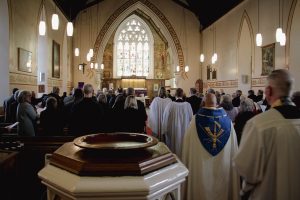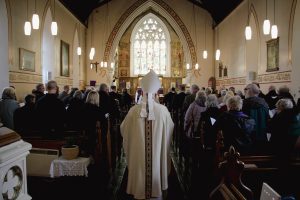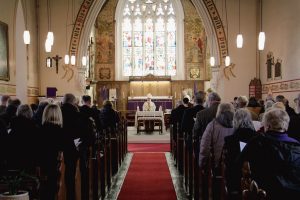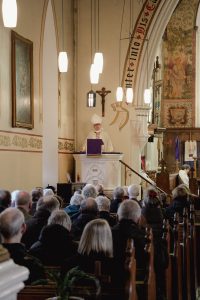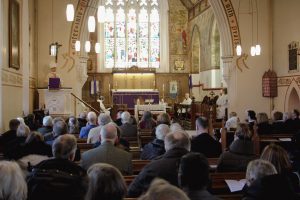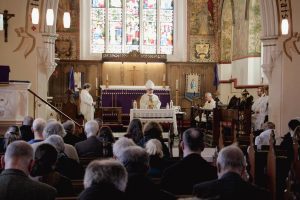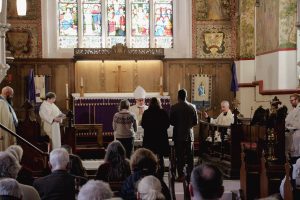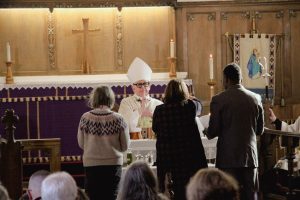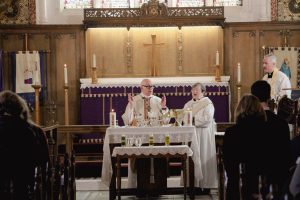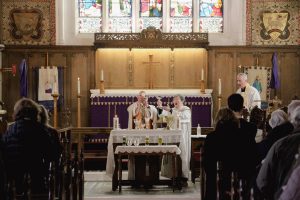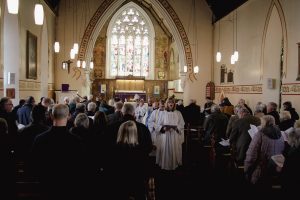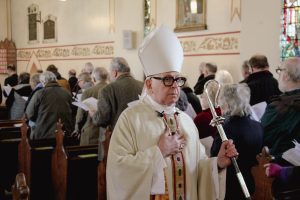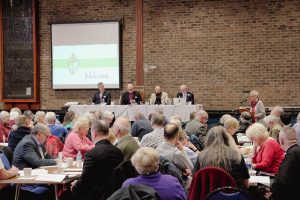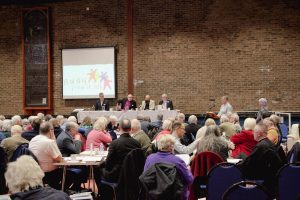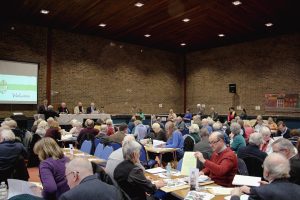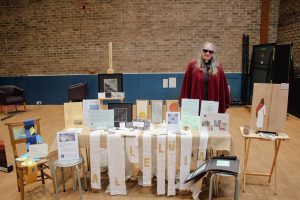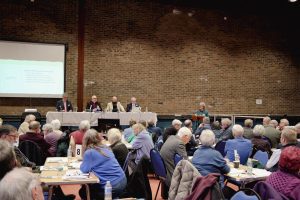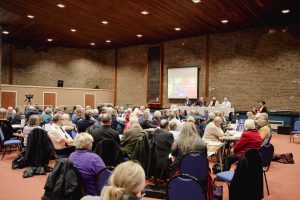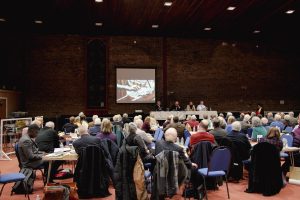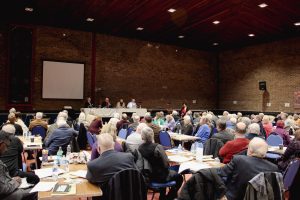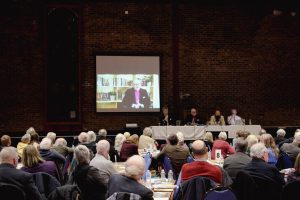Our Diocesan Synod took place on 4 March 2023, coming from Holy Trinity, Kilmarnock and the Howard Centre.
Bishop Kevin’s Charge to Synod
From the Gospel of John that we’ve just heard…
Some Greeks came to Jesus and said: “Sir, we wish to see Jesus.”
“Sir, we wish to see Jesus.”
That is the reason every one of us is here: “we wish to see Jesus,” to experience God, to witness the Holy Spirit moving among us. The one thing we all have in common, lay and ordained, women and men, the one thing we have in common is our baptism, and this Synod meets with the sole purpose of recognising how we can go from this place to baptise the culture in which we, the Scottish Episcopal Church, find ourselves.
Often the claim is made that the church should be counter-cultural. Nonsense! We need to be soaked in the culture of the communities in which we find ourselves and then we can respond to God’s call to baptise the world, to make disciples of all the world. Because when we recognise those glimmers of hope, just glimmers of hope, in kindness, generosity, goodness, the glimmers of hope we learned bitterly to recognise during Covid, during lockdown. When we recognise these glimmers of hope then we recognise that God is with us, and even the sceptics and the agnostics and atheists begin to say, “We wish to see Jesus.” We wish to see Jesus.
Significantly, it was Greeks who asked to see Jesus. Outsiders recognisable as philosophers who sought truth, the truth of all things, which we see in Jesus, which we experience in our souls. Where is my soul? My soul is that place deep within where what I feel meets what I think, meets what I most yearn for, the place where I am most authentically me, where in the silent watches of the night, no matter what the distractions by which we try to avoid the silence, that lack of meaning and purpose. We try to avoid silence. The silent watches of the night, the night of the dark tomb of loneliness, disappointment, failure – the silent watches of the night in which I recognise the truth of who I am, the me that only God knows, the Truth.
This Synod meets to journey together to recognise the truth, to recognise the very soul of the diocese: this is that place where what we feel meets what we think, meets what we most yearn for. Friends, we wish to see Jesus in the glimmers of hope in our discussions and debates: what we think meets what we feel, meets what we most yearn for, glimmers, just glimmers of hope in which we can recognise the Holy Spirit moving among us in this, our Diocese.
The Greek community of Jesus’ day were famous for their intellectual quest for truth. To respond to God’s call to ‘baptise our culture’, we need to embrace all means of truth. We need to embrace scientific inquiry, technological advances, intellectual rigour, recognise these facets of our life as glimmers of Hope, not threats to our faith, the very soul of which is encapsulated in the introduction to the confession. The simple words – ‘there is no room for fear in love’ – God is love, the Truth. No fear. Glimmers of Hope in our culture as the Holy Spirit shows herself in debate, argument, the quest for Truth.
And the truth of our communities, our diocese is that there is real human need which during these last years we have responded to, shown our response in food banks. There is abuse, real need, shown in refugees, and we have shown that we welcome those who need refuge. We welcome the asylum seeker, the refugee. As we pray for peace, we welcome people to make that peace real. And that is why we can pray for peace in our world. so we make real that glorious reading from the letter to the Philippians, the epistle read every Palm Sunday, and always remember our blessed Lord did not know the end of the story at that point. Those words take them with you.: “Let the same mind be in you as was in Christ Jesus”, the same mind as the son of God, who is God, who is love. In their suffering, whoever they are in their suffering, we see Christ Jesus. In our loneliness, misunderstandings, disappointments, failures, we, I, enter the very mind of Christ, the very soul of God. The very words themselves are glimmers of hope, glimmers of the Holy Spirit moving among us, in us to make us more open to others, inclusive, to baptise the culture, to welcome all to see Jesus. We want to see Jesus.
I was brought up in a tradition where we were taught never to mention the Holy Name, never to mention the Holy Name of Jesus; it had to be “our Lord” just as our Jewish friends would never write ‘God’ but only G-D. It was only when I became a university chaplain that my senior colleague advised me before I went off to take an ecumenical weekend party, my senior colleague whom at least one of this assembly knew well, my senior colleague advised me to stand in front of the bathroom mirror and make myself say, “Jesus, Jesus, Jesus”. I knew how to handle my hat using only three fingers, you’re in complete control and you place it back on your head and it’s always straight. But “Jesus, sir, we wish to see Jesus”.
We need to be soaked in the culture of our times and of our communities to see glimmers of hope, glimmers of the call of God to baptise our culture. The culture of mission and ministry remains one in which I certainly feel as though I am being asked, nay, compelled to make bricks without straw.
In such a situation, how do we respond to God’s call to baptise the culture? The answer lies here, here in the very soul of the diocese. This Synod where ‘what I think’ meets ‘what I feel’ meets’ what I most yearn for’ in the soul, we see, feel, know glimmers of Hope.
The point of the straw in the bricks of the ancient world, the point of straw is that it is the strength of the individual brick baked in the sun. The straw brings strength, inner strength, spiritual strength, the glimmer of Hope. The spiritual strength of our congregations is the glimmer of hope in a world where we gather our own straw. We have to be spiritually alive and strong.
How do we gather that inner strength, as individuals, as congregations as a diocese? Simply look at the motto on the sign outside your own church and there you see how ‘what I think’ meets ‘what I feel’, meets ‘what I most yearn for’, how the soul gains strength, is nourished into a building of individual bricks, a body of individual members, the body of Christ. The motto of the Scottish Episcopal Church – Evangelical Truth and Apostolic Order, the answer to the question – we want to see Jesus, the means by which in our communities we baptise our culture.
Evangelical truth: we are a community of those who seek the understanding of the Holy Spirit in and through Scripture. We take Scripture seriously and enjoy a good story, enjoy taking the culture seriously. The great story of God’s people who were condemned, or was it privileged, to make bricks without straw because they had to recognise their own inner resources: the glimmers of hope. I wonder how Moses and Aaron got people to where God’s people did not necessarily want to be led. And in the glorious words of the Authorised Version, there were murmurings… Oh, the murmurings! Isn’t that what a Diocesan Dynod Synod is about? The murmurings? Isn’t that why you turned out to get here for nine o’clock this morning? For the murmurings? And to quote the old Negro spiritual, “Oh, how much that causes me to tremble, tremble, tremble” The murmurings: the very enemy of spiritual growth. Evangelical truth. God is with us in the word we seek. The glimmers of hope.
In the story of Abraham and his great journey, we learn the great lesson of the great soul, that Truth is a journey, not a destination. Glimmers of hope made real through Apostolic order, our worship this Eucharist makes real Jesus’s presence in our midst Do this in remembrance of me. In our Lord Jesus Christ, God reaches out to every one of us, God is with us in every aspect of our lives, glimmers of Hope in worship and Eucharist, which speaks of suffering and death but also resurrection, ascension. This is the language by which we give meaning and purpose, baptise our culture: we handle bread and wine. We are that near to God.
After Easter, material will be available to the whole diocese. And I hope every congregation will make use of it. The material is there to help us look at our life and recognise the glimmers of hope that is the soul of the diocese, that makes real the vision that we see Jesus, we baptise the culture and live in the hope of heaven. The material arose out of sessions at last year’s clergy conference, and it is designed for us to look at ourselves and recognise the glimmers of hope in our midst. On a practical ‘Canon 4 level’, when next the diocese draws up the profile, individual charges will have the reflections there, ready, but more than that, much more than that: we will have worked together to journey toward the truth, the truth of who we are as individuals, as congregations, as a diocese.
There is so much hope, so many glimmers here in our very soul within the bricks that make up our diocese.
We are disciples. I am a disciple. I’m an intentional disciple because I find faith exciting, because I want to know more, because I want to deepen my spiritual life. We are strong. We need to recognise our inner strength, the truth. We wish to see Jesus through God who reaches out to us, who reaches out to us that we may baptise our culture and the communities in which we live.
As someone famous once wrote, “time is too short for me to tell you” of the glimmers of hope I witnessed last year at the Lambeth Conference. Lee Johnson’s article in Inspires covering the Anglican Consultative Council meeting in Ghana conveys the flavour of what these individual international gatherings can bring us.
The recent institutions in our Diocese are more glimmers of hope of new leaders coming into communities, innovative areas of ministry, new clergy in the diocese where we are offering help and support to communities who seek their future, and support to clergy and their families; and the continuing refinement of the recruitment process for individual vestries and vacant charges. We have two ordinands who are actually with us today who will be ordained in the early autumn: Glimmers of hope.
These glimmers of hope are, paradoxically, the fulfilment of our vision of being with God and yet they leave us eager to say, “We wish to see Jesus.”
Amen.
Bricks Without Straw
Bishop Kevin’s Bricks Without Straw initiative was announced during Synod. Further videos and resources will be made available later in the year.
Bishop’s Lent Appeal 2023
This year, we revert to a home-based charity for Bishop Kevin’s Lent Appeal, for which he has selected an enormously deserving recipient with close ties to our Diocese, the Mothers’ Union of Glasgow and Galloway.
You can donate here: https://www.justgiving.com/page/bishopkevinslentappeal2023
Elections
Miss Trudy Hill was elected as Lay Representative to General Synod. Mr Paul Hindle, Dr David Hickson, Mr Richard Horrell, and Mr Richard Smith were elected as Alternate Lay Representatives to General Synod in that order.
The Rev Elizabeth Breakey and the Rev Keith Thomasson were elected as Clergy Representatives to General Synod. The Rev Debbie Davison, the Rev Canon Gordon Fyfe, the Rev Heller Gonzalez, and the Rev Dom Ind were elected as Alternate Representatives to General Synod in that order.
For a full list of our diocesan representatives to General Synod, check this page.
No nominations were received fot the Mission Board representative postion. This post has been remitted to the Bishop’s Core Group to fill.
The Very Rev Kelvin Holdsworth was elected to the Administration Board for a four-year term. The Rev Harriet Johnston was elected to the Faith and Order Board for a four-year term.
Resolutions
Resolution 1: “That the revised Canon 4 should not pass its second reading and should go back to the Faith and Order Board for further deliberation.”
Proposed by Dr E Routledge and seconded by the Rev Paul Watson, St James the Less, Bishopbriggs.
This resolution was passed and received the following votes:
Clergy
For: 22; Against: 6; Abstentions: 3
Laity
For 42; Against: 2; Abstentions: 3
Resolution 2: “That General Synod resolve to provide thorough teaching in discernment to all members of the Episcopal Synod by making this more explicit and time specific in the text of Canon 4.”
Proposed by Margaret Gascoigne, Holy Name Cumbernauld and seconded by Nigel Rayner, St Ninian’s, Troon.
This resolution was passed and received the following votes:
Clergy:
For: 19; Against: 4; Abstentions: 6
Laity
For: 30; Against: 7; Abstentions: 11
Opinions
Opinions from Diocesan Synods on second reading Liturgy
The Rev Canon Dr Nicholas Taylor (NT) outlined the background to the liturgies. With regard to the liturgy on Authorised Lay Ministries, a view from one contributor was expressed that the although the liturgies contained therein were satisfactory, the title was not, as there was no uniform and authorised acceptance of such ministries across the Province. It was therefore suggested that it should be rejected. NT felt this was beyond the authority of the Liturgy Committee and should be referred to the College of Bishops. Another contributor wondered if there was a possibility of compromise in the naming of the booklet, but there was no further discussion or resolution proposed on this second reading.
Opinions from Diocesan Synods on Canon 4
In addition to the aforementioned resolutions that were passed regarding Canon 4, there was much further discussion and opinion expressed regarding it, which is summarised below, with the last item explaining the process that concluded with the acceptance of Resolution 1 above.
Length of Episcopal Tenure (Preliminaries Section 3c): there was a suggestion that the wording be changed to ‘on a rolling basis the period of office should not be more than 4 years’. This was not discussed in any further detail or voted upon.
Eligibility for voting: there was a strong feeling that if a clerical appointment to a charge was made during a vacancy (i.e. after the original Mandate), that person should nevertheless have a vote in the Episcopal Election.
Confidentiality: concern was expressed by many about the lack of confidentiality still likely to be evident in the process, although it was also acknowledged that in an era of electronic dissemination, this remained very difficult to police. It was suggested that interviews of candidates should be much more effectively spaced out to avoid candidates meeting each other.
Training: with regard to Paragraph 5 in the Draft Guidelines on training, the query was raised about who would provide this, and whether somebody designated ‘neutral’ would be available to charges throughout the process. It was reported that this would be enabled by the Diocese but enacted by the Province, perhaps by the means of the SEI and possibly incorporating external agencies. In response, this issue was also reported to be still under discussion by the personnel committee constructing the guidelines.
Preparatory Committees: regarding section 12 it was suggested that a meeting between the Episcopal Synod and both Preparatory Committees (where two had been formed) would be welcomed.
Section 23: it was felt by a small number that a vote of ‘None’ is undemocratic, but a resolution to this effect was soundly defeated.
Numbers of Candidates: there was a proposal to abolish the need to have a specific number of candidates and also the need to vote in houses. Neither proposal was discussed in detail or voted upon.
Preparatory Materials: It was felt that the process of profiling each Diocese before the election process began was sound but that changes in the Electoral Process were required.
Electoral Process: although the draft guidelines provided were commended, it was remarked that they were not enforceable, and dissatisfaction with the subsequent electoral process resulted in by the alternative suggestions of passing on the views of the Preparatory Committee to the College of Bishops or to an Electoral College (as suggested in the original questionnaire circulated on Canon 4) for a decision. Either of these options would avoid the short presentations to an audience that were disliked by many who felt that it resembled too much a beauty contest or talent show. Although the Provincial Representative from the Canon 4 Committee felt that the question of a ‘beauty contest’ had been addressed, others disagreed, and notwithstanding the further urgings of the Provincial Representative not to cast away the hard work undertaken in the preceding 4 years, this dissatisfaction led to the view being expressed that the Canon was not fit for purpose based upon the experiences of Synod members who had emerged from our last Electoral Synod in a severe state of disappointment and distress, and which concluded with the proposal of Resolution 1 above.
Photographs
___________
A livestream of the proceedings was available on this page.
In the agenda for the day, two items for discussion required a response to General Synod. One was a response to the revised Canon 4 (Of the Calling and Election of Bishops to Vacant Sees) which received a first reading at last year’s General Synod.
Download PDF copies of: • Canon 4 – as passed at First Reading General Synod 2022 • Canon 4 Commentary • Canon 4 Draft Guidelines
A second item for discussion was that of three new liturgies that received first reading in 2022 and are now passed to Diocesan Synod for comment as follows:
• Pastoral Offices for Priests • Pastoral Offices for Deacons • Pastoral Offices for Readers and Authorised Lay Ministers
Saturday 4th March 2023 at The Howard Centre, Kilmarnock. (Please note that times are given as a guide and might be subject to change on the day.)
09.00 Registration, tea and coffee in the Howard Centre
09.10 – 09.40 Freshers’ meeting (with the Rev Canon Gordon Fyfe) in the Howard Centre
09.45 – 10.45 Eucharist including Constitution of Synod and Chrism Mass at Holy Trinity, Kilmarnock
11.00 Bishop in the Chair
Welcome
Apologies for absence (Diocesan Secretary)
Meeting Appointments: Assessor (Bruce Erroch KC), Minute Secretary (Mr John Mitchell), tellers (Mrs Christine Hughes, Ms Iolanthe Stack and Ms Janet Chalmers)
Synod’s approval for any guests and non-voting members to speak, or Chair sessions
Provincial Staff representative – Mr Malcolm Bett, Treasurer, Scottish Episcopal Church
Appointments according to the constitution and Canon 61, inc. Diocesan Secretary, Diocesan Treasurer, Diocesan Auditor, (Canon 61 Res 9)
Buildings Committee (Canon 50.9), The Dean, Diocesan Architect, Diocesan Surveyor, Diocesan Treasurer, Rev Canon G Fyfe, Mr R Webster, Mr S McVey, Dr D Lewer
Boundaries Committee (Canon 50.8) Chair: The Dean, Members: Mr M Axford, Rev S Maitland, Mr P Hindle, Mr D Rose, Ms J Whelan, Mr R Burgon, Rev M Goodman
Approval of Diocesan Synod Minutes of 2022 and any Matters Arising from same
Notice of any AOCB agreed with Bishop prior to the meeting.
11.10 Election announcement (the Dean)
Diocesan members of General Synod:
2 Clergy members to be elected from Synod for a 4-year term
1 Clergy member to be elected for a 2nd 4-year term (assuming no more than 2 other nominations)
1 Lay member to be elected for a 2nd 4-year term (assuming no further nominations)
4 Alternates from Clergy to be elected for a 1-year term
4 Alternates from Laity to be elected for a 1-year term
Diocesan Representatives on Provincial Boards:
1 Diocesan Clergy Representative on Faith and Order Board
1 Diocesan Representative on Mission Board – Clergy or Laity
1 Diocesan Representative on Administration Board – Clergy or Laity
11.30 Report – Protection of Vulnerable Groups (Mrs Anne Jones)
11.40 Presentation of 2022 Accounts and Auditor’s report, and of 2023 Budget (Diocesan Treasurer)
12.05 Canon 4 Revisions: summary by The Dean leading to table discussions to formulate possible responses/Resolutions to General Synod in afternoon session.
12.30 Bishop’s Lent Appeal – Bishop to introduce speakers from Mothers’ Union AFIA Charity
12.55 Lunch in main hall
1.40 A Season for Christian Life: short video presentation
1.45 Submission of Synod Returns (Synod Clerk)
1.55 Matters for General Synod
1.55 to 2.10: Diocesan Response to 3 new Liturgies (Rev Canon Dr Nicholas Taylor)
2.10 to 2.40: Feedback from morning floor discussions and Resolution (The Dean) concerning Diocesan Response to Canon 4 Revision. Vote in houses for or against resolution.
2.40 Provincial Environment Group Presentation
3.10 Short Break
3.20 Canon Missioner – Focus on Wellbeing
3.30 Issues for Synod: The Dean
East End Team Ministry Canonical Changes
Election Results
Trustee Training
Provincial Statistics Response
3.55 Any AOCB agreed before the meeting.
4pm Confirmation of the Acts of Synod and The Blessing.
Synod 2024 – Saturday 2nd March

